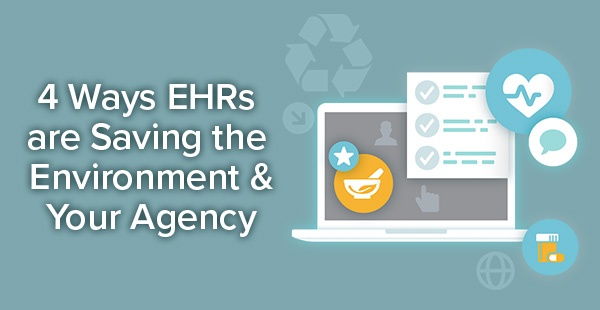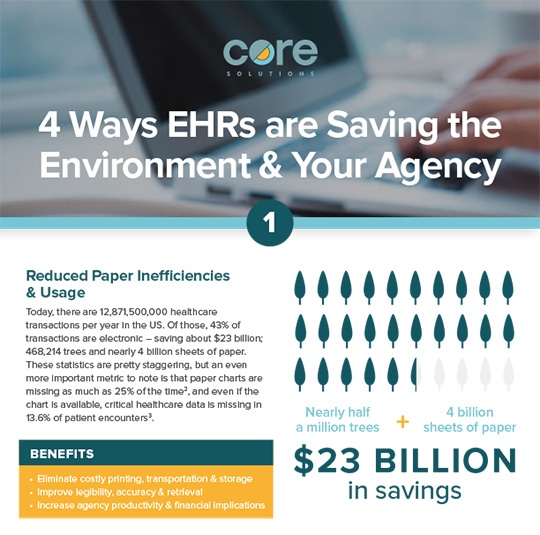INFOGRAPHIC: 4 Ways EHRs Are Saving the Environment and Your Agency
by Core Solutions on July 12, 2016

The proliferation of Electronic Health Records (EHRs) and their adoption has amassed benefits that reach beyond provider and patient efficiencies and compliance, to the health and sustainability of our global environment. Digitized patient records not only reduce paper use, but patient travel and reliance on plastics used in traditional x-ray films and other waste, said a recent Kaiser Permanente report. As more and more healthcare organizations embrace technology as a result of pay-for-performance, patient-centered medical home and accountable care organization healthcare models, a ripple effect of human health and global sustainability improvements ensue, validating the necessity of health IT implementation and adoption.
View the infographic to learn the end-to-end benefits EHRs have on the environment and your agency:
- Reduced Paper Inefficiencies and Usage
Today, there are 12,871,500,000 healthcare transactions per year in the U.S. Of those, 43% of transactions are electronic – saving about $23 billion; 468,214 trees and nearly 4 billion sheets of paper. These statistics are pretty staggering, but an even more important metric to note is that paper charts are missing as much as 25% of the time2, and even if the chart is available, critical healthcare data is missing in 13.6% of patient encounters3. - Increased Patient Safety & Satisfaction
The care experience and patient outcomes improve when providers and clients can easily engage and communicate electronically. Not only do EHRs improve legibility and access to clinical notes, but they can provide reminders about patient allergies, dosages or when tests and preventative services are upcoming or overdue. - Limited Emissions & Gas Consumption
The ability to refill prescriptions online and use patient portals for non-emergency issues reduces unnecessary office visits, leading to decreased emissions and gas consumption. A recent Kaiser Permanente survey that measured the environmental footprint of EHRs reported that gasoline consumption by patients was reduced by about 3 million gallons per year through individuals avoiding non-urgent medical office visits4. - Enterprise-Wide Benefits
EHRs offer enterprise-wide benefits to healthcare organizations by streamlining, personalizing and integrating healthcare delivery. By providing real-time visibility into process workflows, EHRs eliminate redundancies across departments and agencies and deliver actionable intelligence to lower costs and improve care delivery. EHRs also automate key administrative processes by providing pre-built forms that facilitate reporting to agencies.
Share this Infographic On Your Site
Sources:
- Going Green = Easy + Save Money, DocComply
- Tang PC et al. Measuring the Effects of Reminders for Outpatient influenza Immunizations at the point of clinical opportunity. JAMIA 1999;6:115-121
- Smith PC et al. Missing Clinical Information During Primary Care Visits JAMA 2005;293:565-571
- E-Health Records Produce Some Environmental Benefits, Information Week, Healthcare
- April 2024 (2)
- March 2024 (4)
- February 2024 (1)
- October 2023 (3)
- September 2023 (3)
- August 2023 (2)
- June 2023 (2)
- May 2023 (3)
- April 2023 (4)
- March 2023 (2)
- November 2022 (3)
- October 2022 (1)
- September 2022 (1)
- August 2022 (3)
- July 2022 (1)
- June 2022 (1)
- January 2022 (2)
- December 2021 (1)
- October 2021 (2)
- September 2021 (2)
- August 2021 (2)
- July 2021 (5)
- June 2021 (5)
- March 2021 (2)
- January 2020 (3)
- November 2019 (3)
- October 2019 (2)
- July 2019 (1)
- June 2019 (1)
- May 2019 (1)
- April 2019 (3)
- October 2018 (1)
- September 2018 (1)
- August 2018 (1)
- July 2018 (1)
- June 2018 (1)
- May 2018 (2)
- April 2018 (1)
- March 2018 (1)
- December 2017 (1)
- October 2017 (2)
- September 2017 (1)
- June 2017 (2)
- May 2017 (2)
- April 2017 (1)
- February 2017 (2)
- January 2017 (3)
- November 2016 (2)
- October 2016 (3)
- September 2016 (2)
- August 2016 (1)
- July 2016 (2)
- June 2016 (1)
- May 2016 (3)
- April 2016 (2)
- March 2016 (2)
- February 2016 (2)
- January 2016 (3)
- December 2015 (2)
- November 2015 (4)
- October 2015 (3)
- September 2015 (4)
- August 2015 (1)




Let us know what you think